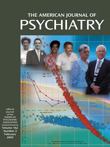Possible Neuroleptic Malignant Syndrome With Aripiprazole and Fluoxetine
Mr. A, a 43-year-old man, was admitted to our hospital with severe depression and psychotic symptoms. Three weeks before, he had been admitted to a different hospital for similar symptoms and had been given bupropion and risperidone, titrated up to 150 mg/day and 1 mg/day, respectively. However, for unapparent reasons, these medications were discontinued abruptly after a week, and Mr. A was given aripiprazole, started at 30 mg/day, and fluoxetine, 20 mg/day. A week later, Mr. A was discharged from the hospital with the same regimen. Subsequently, after taking these medications for about 2 weeks, Mr. A came to us with complaints of muscle stiffness, restlessness, and fever of a week’s duration. In addition, he also had depressive and some psychotic symptoms, but his family’s predominant concern was his physical symptoms.Upon examination, Mr. A exhibited marked psychomotor retardation, mask-like facies, and severe rigidity, with cog-wheeling, sialorrhea, tremors, and akathisia. He had fever (99.8°F), labile blood pressure (148/99–137/89 mm Hg), and tachycardia (110 bpm). He was fully oriented and did not display any cognitive deficits. Laboratory investigations revealed elevated creatine phosphokinase (248 IU/liter; normal range=0–200) and alanine aminotransferase (61 IU/liter; normal range=0–35) levels, whereas the results of renal function tests, a CBC, and a urine examination were normal. Although Mr. A had stopped taking aripiprazole 2 days before he came to visit us, his symptoms had shown little improvement. Fluoxetine was discontinued, and Mr. A was treated symptomatically with benztropine and acetaminophen and had an uneventful recovery within a week, with his creatine phosphokinase level returning to normal (138 IU/liter).
References
Information & Authors
Information
Published In
History
Authors
Metrics & Citations
Metrics
Citations
Export Citations
If you have the appropriate software installed, you can download article citation data to the citation manager of your choice. Simply select your manager software from the list below and click Download.
For more information or tips please see 'Downloading to a citation manager' in the Help menu.
View Options
View options
PDF/EPUB
View PDF/EPUBGet Access
Login options
Already a subscriber? Access your subscription through your login credentials or your institution for full access to this article.
Personal login Institutional Login Open Athens loginNot a subscriber?
PsychiatryOnline subscription options offer access to the DSM-5-TR® library, books, journals, CME, and patient resources. This all-in-one virtual library provides psychiatrists and mental health professionals with key resources for diagnosis, treatment, research, and professional development.
Need more help? PsychiatryOnline Customer Service may be reached by emailing [email protected] or by calling 800-368-5777 (in the U.S.) or 703-907-7322 (outside the U.S.).

